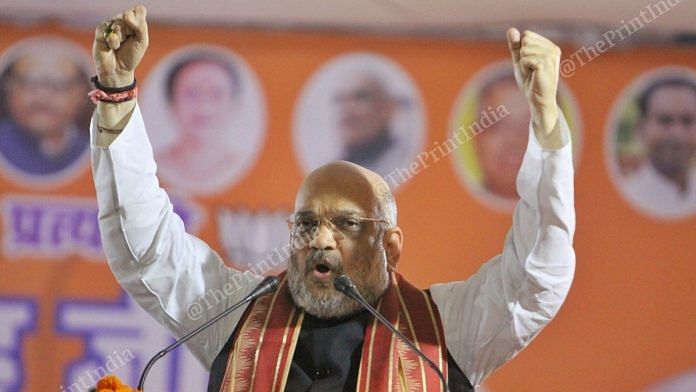There is talk about another magical, multi-tasking, super identity card for Indians again. As if all the national anxieties caused by Aadhaar and the National Register of Citizens weren’t enough. Now, Union Home Minister Amit Shah has proposed another paperwork agni-pariksha for Indians – a shiny, new, multipurpose, jumbo identity card that will house all the information like Aadhaar, passport, bank account, driving license and voter card.
Every few years, someone in the government has a bright idea about a new card that they say will solve all problems for citizens, the government and their interface. From photo identity cards to PAN cards to Aadhaar cards – each was projected to be the magic pill that India needed. And the transformative promise of each new card keeps getting bigger and better. All this would be very benign – even noble – if it didn’t unleash a slothful and brutal bureaucracy on unsuspecting people along with the tyranny of paperwork.
Each card was supposed to make sure that Indians didn’t need to carry multiple IDs anymore. And Amit Shah’s new card would also aim to do the same. Of course, the home ministry quickly told reporters that this was just Amit Shah’s idea for the future and not a concrete proposal in the pipeline. But that is how things begin in this government – politicians float trial balloons to test and trigger public debate.
Also read: On privacy, Supreme Court’s Aadhaar verdict doesn’t even engage with the concerns
One ID to rule them all
Many years ago, there was the humble ration card that Indians were quite content with. But it wasn’t enough. In the 1990s, a tough-talking Chief Election Commissioner called T. N. Seshan came up with the idea of a photo identity card for every voter (actually, he revived an old unfinished 1950s’ idea).
The order was issued in August 1993 and it gave the government 16 months to make the new card for all voters. Seshan was the biggest salesman of the new card calling it an antidote to bogus voting and election fraud. He even threatened the Narasimha Rao government that if the cards were not ready by November 1994, there will be no elections in 10 states in 1995. His constant deadlines drilled dread into politicians. Many feared that some eligible voters may even be disenfranchised because of the logistical nightmare. And the Supreme Court had to intervene to ensure that state elections were not held hostage.
The 1990s was also the decade when PAN card became the ultimate panacea for all of India’s financial ills. It was projected to clean up financial transactions like no other, by linking documents and movement of money of individuals and entities.
It was a 10-character identification card – a combination of numbers and letters. The original PAN system of 1972 was not a centralised system and there was a lot of duplication because it was done manually with no national database. So, in the mid-1990s, the government began to overhaul the PAN card system that would give Indians a unique, all-India number. With name, father’s name, gender and date of birth, it became a virtual identity card for many.
That was until Nandan Nilekani of Infosys came along with another all-important card called Aadhaar. The card, which he called a “turbocharged version” of the American social security number, was meant to root out fraud, corruption, misuse of government’s welfare funds and raise the number of taxpayers. This created a new set of fears among many citizens about privacy and a surveillance state. In a protracted battle, these collective anxieties ended in the Supreme Court, which upheld its constitutional validity last year.
All this head-banging about Aadhaar was occurring as the entire population of Assam was made to go through a torturous and polarising exercise of proving their identity and their citizenship. Just to make it to the government’s National Register of Citizens.
Also read: A verdict that shows it’s the Supreme Court of real India, not just its elites
One nation, one ID
What the world really needs is more love and less paperwork, said American Broadway singer Pearl Bailey.
And governments love to drown its citizens in paperwork every few years. That’s how strong and so-called decisive governments make their presence felt in people’s lives and unsettle them. And each time, these ideas have been hailed as out-of-the-box, disruptive, game-changing by many. But what it really does is fill people with Kafkaesque anxiety – about paperwork and about being left out. It also brings with it “the slime of a new bureaucracy”, as Kafka said, with inflexible officers, unending demands and long wait in serpentine queues.
Amit Shah’s comment comes in the middle of calls by BJP politicians for an NRC-like exercise across India.
Of course, identity isn’t just a card anymore. It is a contentious issue under the BJP government. The test of identity and citizenship is now also about what you eat, who you love, how much you love the military, who you support and who you oppose. Paperwork is only one fragment in this new quest for ‘One Nation, One Card’ idea.
Every nation has a national identity system, but Indians have been searching for the answer to ‘who are we’ from 2500 BC to Amit Shah.




only print can come out of such reports.
Trying new ways to give ambani some business?
India me machar ko hhane ka kya new effective technique hai ????
There seems to be a growing paranoia on the issue of Indian citizenship, as if the Martians have landed and are slipping into our homes when we are asleep.
Good one! I would like to see more of your articles. Thanks.
I’m a tech geek and what I feel is that this can lead to some big privacy issue as only one I’d could reveal all our information to anyone